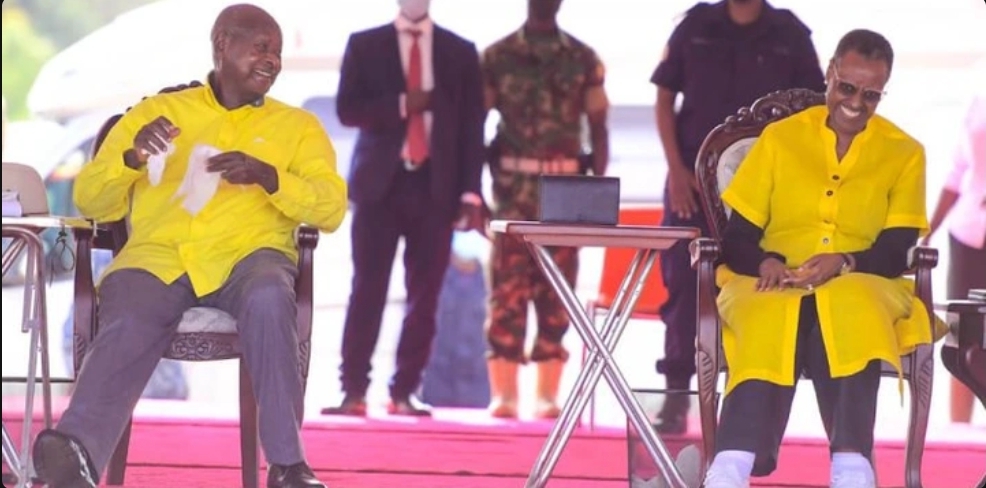Kololo Turns Yellow as Museveni Vows to Scrap School Fees in Public Schools and Win War on Poverty

Kololo Ceremonial Grounds was awash in the iconic yellow of the National Resistance Movement (NRM) as thousands of delegates gathered to attend the party’s National Delegates Conference.
The vibrant atmosphere was marked by a sense of anticipation and purpose, with the spotlight firmly on President Yoweri Kaguta Museveni, the NRM chairman, who delivered a powerful address that set the tone for the party’s vision ahead of the 2026 general elections.
In a speech that resonated deeply with many Ugandans, President Museveni made a historic pledge to implement free universal education across the country in his next term of office, should he be re-elected.
This bold commitment reflects the government’s recognition of education as a fundamental right and a critical pillar for national development.
“I was surprised to learn that the number of private schools in Uganda has overtaken public schools, yet parents still overwhelmingly prefer to enroll their children in public institutions,” Museveni noted. “This is a clear indication that our people have faith in government schools and demand better access to education. It is my promise that this demand will be met.”
The President’s appeal to parents was both heartfelt and strategic.
He urged them to work closely with school administrations through Parent-Teacher Associations (PTAs) to ensure that no unlawful fees are charged in public schools.
“No parent should pay a single coin in public schools,” he emphasized, underscoring his commitment to removing financial barriers that prevent many children from accessing education.
This pledge is expected to have far-reaching implications. Uganda has long grappled with challenges in the education sector, including overcrowded classrooms, inadequate facilities, and hidden costs that burden families.
By committing to free education, the NRM aims to not only increase enrollment but also improve the quality of learning, thereby equipping the nation’s youth with the skills they need for a prosperous future.
But education was just one part of President Museveni’s broader vision for Uganda.
In his address, he urged citizens to intensify the fight against poverty, corruption, and crime—three of the most persistent obstacles to Uganda’s socio-economic progress.
He called on communities to band together in demanding better roads, improved health services, and safe water supplies, particularly in rural areas.
“We must embrace commercial agriculture, support the growth of factories and artisan shops, and develop services and ICT industries,” Museveni said. “Our future lies in a vibrant, diversified economy where money flows freely and opportunities abound for all Ugandans.”
The President’s speech was met with enthusiastic applause from the delegates, many of whom are grassroots leaders and representatives of special interest groups vital to the party’s support base.
On that note, the conference also featured the start of elections for leadership positions within the party’s Special Interest Groups (SIGs), which include Historical Leaders, Veterans, Entrepreneurs, Workers, Youths, Elders, Persons with Disabilities, and Women.
These groups play a crucial role in shaping party policies and mobilizing support at the community level.
Each SIG is tasked with electing a five-member committee, including a Chairperson, Vice Chairperson, General Secretary, Secretary for Finance, and Secretary for Publicity.
Voting takes place by lining up to indicate choice, except for the Workers’ league, which employs a secret ballot system to ensure privacy and fairness.
The elected leaders will later participate in selecting party flag bearers for parliamentary positions representing their respective groups.
NRM Secretary General Richard Todwong took the opportunity to remind candidates of the importance of unity and decorum, urging them to avoid divisive or hateful language that could harm the party’s reputation.
“Our strength lies in solidarity and respect,” Todwong said. “We must lead by example as we prepare for the 2026 elections.”
Security at the Kololo Ceremonial Grounds was visibly heightened, reflecting the importance of the event.
Luke Owoyesigyire, Deputy Spokesperson for Kampala Metropolitan Police, confirmed that multiple security agencies have been deployed to safeguard delegates and maintain order.
“Security personnel have been strategically positioned around the venue, at key access points, and along roads leading to Kololo,” Owoyesigyire explained. “Our goal is to ensure the conference proceeds smoothly and safely for all participants.”
In addition, traffic arrangements have been put in place to facilitate the movement of guests.
Michael Kananura, Traffic Police Spokesperson, outlined the routes designated for delegates and officials, highlighting Sezibwa Road—from Fairway Hotel to Kololo—as the primary access point.
Other major roads such as John Babiha Avenue and Jinja Road remain open to regular traffic, while Lower and Upper Kololo Terraces are reserved exclusively for Very Very Important Persons (VVIPs).
Wampeewo Avenue near the Housing Finance Bank serves as a cutoff point for general traffic.
This National Delegates Conference follows a crucial National Executive Committee meeting held over the weekend at State House Entebbe, which reviewed the party’s readiness for upcoming electoral challenges.
As the conference continues up-to Thursday this week, eyes will remain on how these internal elections and policy pledges will shape the NRM’s trajectory in the run-up to the 2026 general elections



0 Comments